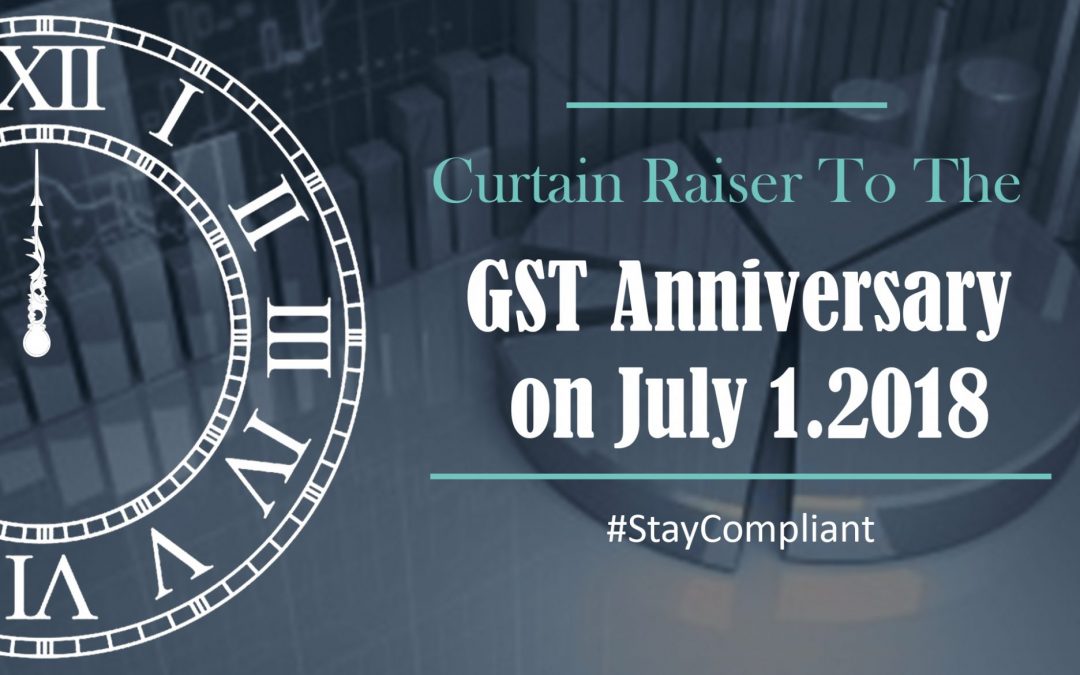July 1, 2018 marks the first anniversary of the launch of the most anticipated tax reform in India. Often termed as ‘India’s new tryst with destiny’, the Goods and services tax (“GST”) was introduced amid varied expectations and apprehensions. While tax compliance seems to have streamlined mostly for large entities, however most medium and small entities are yet to survive the challenges posed by the new taxation regime.
The new digital indirect tax era, aimed at unifying and streamlining indirect taxes and bring the domestic market under one umbrella, needs transformation, right from accounting systems to operations, procurement, supply chain management, logistics, delivery, sales and marketing and finance.
The purpose of this article is to discuss the little tricks to ensure smoother compliance with GST, which may otherwise seem to be a challenging task in itself.
What one should do to be GST compliant and ensure peace of mind?
On being GST compliant: Deliberations on some lessons from the last year
GST and its implementation has kept us on our toes, with changes being introduced almost every week. The Central Board of Indirect Taxes and Customs (“CBIC”) alone has issued nearly 400 notifications/ circulars/ orders in the last year, not to speak of the numerous intimations by the respective State Governments.
Here are a few learnings to ensure better preparedness towards the implementation of the GST regime.
1. Display requirements
Display the GST Registration number and Registration Certificate on the business sign boards. The GST Department in many States have reportedly been conducting verification of GSTIN numbers being displayed on signboards.
2. Input Tax Credit
i. On inward supply side, periodically reconcile the input tax credit as per Inward Supplies Register with GSTR-2A (an automatically generated inward supply-related tax return generated by the GST portal), to avoid ITC reversal because of any mismatch in data reported by supplier. Also, this helps assessing how compliant the vendor is.
ii. Ensure that input tax credit is availed basis proper invoices for inward supplies to avoid denial of credit. Also, list out items for which credit is not available and have a maker-reviewer check for the credit availed.
iii. Organizations need to have a routine review of payment to suppliers outstanding since long. Either pay within 180 days from the date of issue of the invoice or reverse input tax credit on amounts not paid within such time.
3. E-way bill
i. E-way bill has already been implemented nation-wide for both inter and intra state movement of goods. Ensure generation of E-way bill on supply of specified goods (wherever applicable) having value more than rupees fifty thousand.
ii. Remember, different states have come up with different rules for generation of e-way bill for intra-state movement of goods. Ensure to be informed about scenarios where e-way bill needs to be generated in the particular State. For example, in the state of West Bengal, Delhi, Tamil Nadu the limit for generation of e-way bill is Rs. 1 Lakh. Again, for the state of Bihar, the limit has been set to Rs. 2 Lakh.
4. Anti-profiteering
Don’t forget to transfer benefits to your customers if you have enjoyed benefits due to implementation of GST leading to rate changes to avoid any GST Anti-profiteering consequences.
5. Avoid the last-minute rush
Portals are known to act funny when you are least expecting it to. Therefore, it is advisable to avoid last minute filings to surprises of technical glitches. Be prepared, file returns well before due dates or at least upload all details that are voluminous and time consuming like details of B2B invoices in GSTR-1. It would help you to avoid the rush at the last moment and possibility of delay due to technical glitches.
6. Avoid hurdles of GST refunds for exports
Export houses are facing challenges related to refund claim as large amounts are blocked in refund claims which in turn is hitting the working capital. Some key points which help in the faster redressal of the refund are:
- The data entered in FORM GSTR-1, FORM GSTR-3B and shipping bills/bills of export should be thoroughly checked to avoid any mismatch.
- It is advisable for such export houses to cross check the information entered by them in the ICEGATE portal and GSTN portal, as any discrepancy would result in rejection of refund claim.
Value declared in the tax invoice should be equal to the export value declared in the corresponding shipping bill under the Customs Act, for faster processing of refund claims. Lastly, proper documentation like invoices, shipping bills, FIRCs / BRCs etc. are required for the smooth processing of refund claims.
7. Addressing Certain Other Points of Concern
i. On the outward supply side, prepare the invoice template ensuring that all mandatory information required as per law is available therein.
ii. Though the Government has deferred applicability of reverse charge on inward supply from unregistered person, the same is likely to be re-introduced soon. So, the organisations need to think twice before availing any goods and/or services from unregistered vendors else, negotiate optimally, raise an invoice on self and pay GST under reverse charge.
iii. The stock transfer from one state to another state or within the same state to a different business vertical is chargeable to GST which would result in the blockage of the working capital. Hence, it is advisable for the organizations to plan accordingly.
8. The Road Ahead
With the above measures in place, one can experience the ease of doing business and plan wisely at each stage of operations. Let’s hope the simplification of the taxation structure will go a long way in enabling business operations to gain in the long run.
Stay tuned for our upcoming posts on this topic!
For further queries or clarifications pertaining to compliance under GST, please feel free to contact us at inquiries@lexplosion.in
Authors:
- Sourav Choudhary (Senior Manager, Finance & Accounts)
- Pankaj Choudhary (Senior Associate, Legal Operations)
- Priyanka Agarwal (Senior Associate, Legal Operations)
- Sharanya Mukherjee (Legal Associate, Legal Operations)
Disclaimer
All material included in this blog is for informational purposes only and does not purport to be or constitute legal or other advice. The Blog should not be used as a substitute for specific legal advice. Professional legal advice should be obtained before taking or refraining from an action as a result of the contents of this blog. We exclude any liability (including without limitation that for negligence or for any damages of any kind) for the content of this blog. The views and opinions expressed in this blog are those of the author/(s) alone and do not necessarily reflect the official position of Lexplosion. We make no representations, warranties or undertakings about any of the information, content or materials provided in this blog (including, without limitation, any as to quality, accuracy, completeness or reliability). All the contents of this blog, including the design, text, graphics, their selection and arrangement, are Copyright 2018, Lexplosion Solutions Private Limited or its licensors.
ALL RIGHTS RESERVED, and all moral rights are asserted and reserved.




